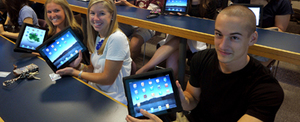Notre Dame launches eReader study, creates first paperless course
Published: August 27, 2010 / Author: Shannon Chapla

“This has become known as the iPad class,” Corey Angst, assistant professor of management at the University of Notre Dame, told his students on their first day of class Aug. 24. “It’s actually not…it’s ‘Project Management.’”
A member of Notre Dame’s ePublishing Working Group, Angst is debuting the University’s first and only class taught using Apple’s new wireless tablet computer to replace traditional textbooks. The course is part of a unique, year-long Notre Dame study of eReaders, and Angst is conducting the first phase using iPads, which just went on sale to the public in April.
“One unique thing we are doing is conducting research on the iPad,” Angst says. “We want to know whether students feel the iPads are useful and how they plan to use them. I want them to tell me, ‘I found this great app that does such and such. I want this to be organic…We have an online Wiki discussion group where students can share their ideas.”
The working group participants are from a broad array of colleges and departments, including the Mendoza College of Business, Notre Dame Law School, College of Arts and Letters, First Year of Studies, Hesburgh Libraries, Office of Information Technologies, Hammes Notre Dame Bookstore, Office of Sustainability, Notre Dame Press and Office of Institutional Equity.
Members are evaluating the creation, distribution, consumption and usefulness of electronic course materials in an academic setting by examining the usefulness of the iPad as an eReader, with the broader goal of designing an “ePublishing ecosystem” that serves faculty, students and staff by making the creation, distribution, sharing, reading and annotation of eMaterials simple and inexpensive.
“eReaders are quickly being adopted for reading mass market literature, but also align well with the desire of higher education faculty and students to promote sustainability by reducing paper use,” says Paul Turner, manager of Academic Technologies in Notre Dame’s Office of Information Technologies. “But there are a wide range of issues we want to understand in order to decide when and where mobile wireless devices like the iPad can best replace textbooks and other paper-based course materials. Working with research faculty such as Professor Angst gives us the opportunity to study how students in multiple disciplines adopt and adapt to using eReaders.”
“The world of higher education today demands seamless touch points connecting teaching, learning, research, engagement, service and personal activities,” says Ron Kraemer, Notre Dame’s vice president of information technology and chief information officer. “Using the iPad in this course for both research and education will help us explore how we might enhance the education experience to better prepare our students as global citizens.”
The iPads will help Angst’s students manage real-world projects. For example, one team will help South Bend’s Center for the Homeless establish a guest-run coffee shop.
“They will meet with stakeholders, plan a strategy and write a detailed work plan for how to get it done in seven weeks,” Angst says. “And, I expect the students will rely on the iPads to develop creative ways of collaborating with their teammates. They can share documents, timelines and to-do lists, and show sketches to their clients. The possibilities are endless.”
The students will not, however, get to keep their iPads. They will be used for pilots in other courses later in the academic year sponsored by the Law School, Arts and Letters, First Year of Studies and Hesburgh Libraries.
For the moment, however, Angst’s 40 students are the only ones on campus walking around with University-loaned iPads and they fully intend to show them off and play games and music with them, in addition to developing brilliant ideas to improve society.
And they don’t have to sneak. It’s part of the plan.
“We asked the students to sync the iPads with their personal iTunes accounts,” Angst says, “so they feel a sense of ownership and so all of their applications will travel with them on a single device.”
“I have never used an electronic reader for a textbook,” says senior Jordan Rockwell. “I’m really excited to see how this new technology will aid the class.”
An expert on health IT who researches and advocates electronic medical records, Angst considers the project another step forward in the digitization of society. For the past two semesters, his students have taken digital exams and quizzes and turned in homework via email or Web file. Now, with the iPads, even the textbooks are electronic, making his class entirely paperless.
“Sustainability is a great fringe benefit,” Angst says. “But my motivation has more to do with efficiency. I don’t like stacks of paper in my office.”
He’s not the only one.
When Angst’s students registered for his course, they didn’t know about the iPad aspect. He emailed each student over the summer to let them know, fearing some may back out. Not one did. In fact, he received enthusiastic responses from nearly all of them and everybody showed up on the first day – with an iPad.
“I fully suspect there will be students in this class that really dive into this and maybe even write applications for the iPad,” Angst says. “Hopefully some will use them in their future careers.”
Angst plans to discuss his findings on the study in his new blog.
Contacts: Corey Angst, 574-631-4772 or cangst@nd.edu; Paul Turner, 574-631-3881 or Paul.Turner@nd.edu
/news_and_events/news_articles/article/7421/notre-dame-launches-ereader-study-creates-first-paperless-course




